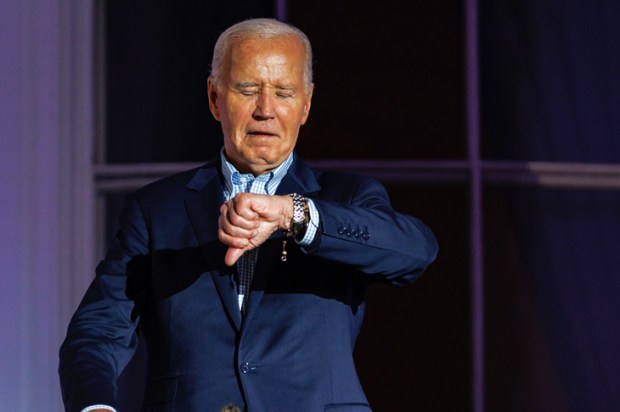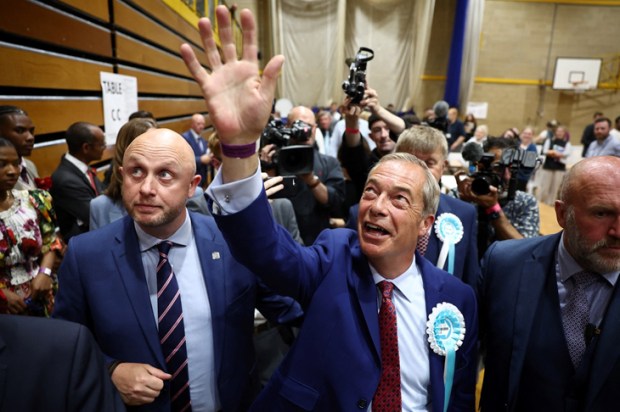Last November, Labor Foreign Minister Penny Wong issued more than 800 temporary visas to Gazans following Hamas’s 7 October Israeli invasion and massacre. By March, that number had risen to more than 2,200 but the government had started cancelling some of those visas ‘to maintain our national security’.
The government now has another reason to regret its hasty decision following the announcement by Senator Fatima Payman that she was crossing the floor to vote with the Greens in support of Palestinian statehood and then quit Labor and sit as an independent.
For decades Labor has profited electorally from courting the ‘ethnic’ vote of migrants. Now, for the first time, it faces the prospect of paying a potentially crucial price at the next federal election. Labor’s support at the last election was already the lowest since 1934 or 1903 (depending how you count it). Now it is being targeted by a group called The Muslim Vote which launched its campaign in the aftermath of 7 October.
One of the convenors of the Muslim Vote is Lebanese Muslim Sheik Wesam Charkawi. Charkawi raised his profile calling for Asio boss Mike Burgess to be sacked after Burgess said that, ‘Sunni violent extremism poses the greatest religiously motivated violent extremist threat in Australia’. Charkawi denounced this as ‘inflammatory comments that further stigmatise and marginalise the Muslim community’. He also claimed that minors who were arrested following the stabbing of Assyrian Orthodox Bishop Mar Mari Emmanuel had been targeted only on the basis of their Muslim faith and that ‘religious profiling was occurring’.
In the UK, most analyses of Labour’s ‘loveless’ landslide in last week’s general election focused on the small swing to Labour and the massive collapse in the Conservative vote, with erstwhile supporters voting for Nigel Farage’s UK Reform party, the Liberal Democrats, or staying at home and not voting at all.
Fewer focused on the success of The Muslim Vote, a new alliance of 23 activist groups, which put Palestine ‘on the ballot’ as Jeremy Corbyn, former leader of the Labour party and friend of Hamas, put it. Corbyn was re-elected in a seat in which 13 per cent of voters are Muslim.
The founders of The Muslim Vote are apparently also fans of Hamas – Anas Altikriti posted photos of himself in Gaza in 2012 meeting Hamas leader Ismail Haniyeh; Azhar Qauyum, the head of Muslim Engagement and Development, wrote in 2014 that Israel’s ‘generosity’ in its withdrawal from Gaza in 2005, was ‘like the “generosity” of Hitler’.
The Muslim Vote has fertile ground to exercise influence with almost four million Muslims in the UK, about six per cent of voters. In 103 constituencies out of 650, 10 per cent of the population are Muslim. In 93, more than 10 per cent are Muslim. In 20 constituencies, more than 30 per cent are Muslim. In seven, 40 per cent are Muslim, and in Bradford West, just under 60 per cent are Muslim. In 2019, all those constituencies were held by Labour.
This time, in seats where Muslims were more than 10 per cent of the population support for Labour was down 11 percentage points and the decline increased in line with the increase in the Muslim demographic. In seats where Muslims make up 10 to 20 per cent of the population, Labour’s vote fell by almost 7 per cent. Where Muslims make up more than 40 per cent of the population – typically in London, Birmingham, and Bradford – the Labour vote was down 34 percentage points.
The Muslim Vote gloated online at its success in punishing Labour, ‘Five brilliant independents including removal of Jon Ashworth’. Ashworth’s case is instructive. He was a former adviser to Gordon Brown, the head of party relations under Ed Miliband, and held a number of shadow ministries. Yet even though he was a member of Labour Friends of Palestine and the Middle East on a massive majority of 67 per cent of the vote, he lost his seat.
Yet the development that will strike the fear of God (Allah?) into the Australian Labor party is that The Muslim Vote propelled the Greens to win a record four seats, one at the expense of Labour’s Shadow Culture Secretary Thangam Debbonaire.
The tactics employed by pro-Gaza supporters were ugly. Health Secretary Wes Streeting said his opponents broadcast fake recordings in which he purportedly said he didn’t ‘f-cking’ care about innocent Palestinians being killed. Labour frontbencher Jess Phillips said the election was the worst she had ever contested with thugs intimidating volunteers by filming them, slashing their tyres and humiliating women. Secretary of State Shabana Mahmoud said she was branded an ‘infidel’ and masked men disrupted her community meetings ‘terrifying’ participants.
‘Folks, only through the grace of The Almighty, without whom nothing is possible, you did it,’ said The Muslim Voice. Yet Allah didn’t smile on everyone. ‘TikTok lawyer’ Akhmed Yakoob, who cut Mahmoud’s vote by more than 40 per cent and said in June that, ‘Seventy per cent of hell will be women’ failed to unseat her. Former Labour MP George Galloway, of the Workers Party of Britain, who won a by-election in March in a landslide in Rochdale, where 27 per cent of the population are Muslims, was also defeated.
Labour’s Muslim vote has always shown significant movement in line with Britain’s policy in the Middle East. Support dropped from 75 per cent in 2001 to 38 per cent in 2004, after the Iraq war but climbed to 64 per cent in 2015 and peaked above 80 per cent when Corbyn was leader between 2015 and 2020.
In Australia, Labor holds 27 of the 29 federal seats with significant Muslim minorities. The Muslim Vote is planning to run candidates in federal Education Minister Jason Clare’s NSW seat of Blaxland where 32 per cent of the population is Muslim, and in neighbouring Watson, the seat of Employment Minister Tony Burke, where 25 per cent of the population is Muslim. Mr Clare got 65 per cent of the vote (after preferences) in the 2022 election and holds the seat with a margin of 15 per cent. Mr Burke won 65 per cent of the vote too (after preferences) and held his seat with a margin of 13.5 per cent.
The key difference electorally between the UK and Australia is that the UK uses the system of first past the post. While Australia’s preferential voting system will work in favour of Burke and Clare, in seats with a strong Green candidate, a shift in the vote of Muslims and other pro-Palestinians could play a decisive role. The Senate is also much more favourable to smaller groups who successfully trade preferences. If the threat of Muslim voters finally forces Labor to be more careful about who it allows to migrate to Australia or seek asylum perhaps some good will come from this disturbing development.
Got something to add? Join the discussion and comment below.
You might disagree with half of it, but you’ll enjoy reading all of it. Try your first month for free, then just $2 a week for the remainder of your first year.













